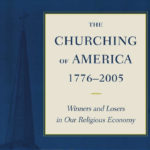By Jim Von Wald
The transitioning of pastoral leadership in rural churches created challenges and opportunities for the pastor and the congregation. Reducing the complications experienced during leadership change can increase the church’s effectiveness related to the missio Dei or mission of God. Christopher Wright, in The Mission of God, wrote, “The whole Bible renders to us the story of God’s mission through God’s people in their engagement with God’s world for the sake of the whole of God’s creation.”[1] Successful leadership transition impacts all areas of the church’s engagement with the world around it. A clear theological purpose to mentor leaders into and through pastoral leadership transition set in place the guardrails to follow God’s purpose to change the world in which it operates. The training, mentoring, and multiplication of leaders without these guardrails could follow culture and tradition’s norms rather than biblical truth.
The study explored options discovered during interviews and literature. It detailed how they can undergird rural pastors and churches through transition. The project launched to uncover best practices for ministerial succession or transition in rural churches, and a summary with suggested best practices will conclude the project.
The research used a qualitative methodology described and defined by Dr. Paul Alexander, President of Trinity Bible College.[2] Prepared questions guided the semi-formal interviews with rural pastors and denomination leaders that produced findings. Mixed methods of research through pertinent literature to pastoral transition, interviews, bylaw, and policy reviews support the thesis’ development. The project scope initially considered only Minnesota Assembly of God rural churches, then expanded to additional relevant options outside of Minnesota and the Assemblies of God. Clarity of definition necessitated defining terms like rural, transition, and succession.
A primary research purpose arose from the number of rural pastors approaching retirement age in the Assemblies of God denomination. The transitional vacancies have reached a critical juncture as replacements do not appear readily available. The anticipated transitions from those retirements do not include changes occurring in pastoral leadership due to other reasons which exacerbate the vacancy issue. An added passion for this project resulted from necessary personal decisions in my clerical role. My spouse and family have invested 20 years planting and establishing a rural Minnesota Assembly of God church. We find ourselves in a season where planning for transition described our current ministry journey. Bird and Vanderbloemen stated, “every pastor is an interim pastor,” therefore, understanding pastoral transition connected desired leadership qualities and personal motivation to support other pastors in the process. [3]
This project initially launched from the challenge of finding resources or literature to guide rural pastors or churches through transition or succession. In contrast, many studies address the process and the consequences of change and succession in urban and suburban settings or large church environs. Lack of transition resources for the rural areas communicates a sense of disregard and lack of value for the rural church.
All AG churches have value and are needed to accomplish the AG’s mission. Therefore, it is important that the AG not view existing churches as second class or missionally inferior to church plants, but value existing churches for the strengths they have; these strengths often come only through longevity and credibility in a community. Every church that pursues God’s mission has value in His Kingdom and should have value in the AG.[4]
Often, rural pastors have access to fewer professional development opportunities in transition and succession areas from a rural practitioner’s view. In The Catalyst Leader, Brad Lomenick argues, “…culture is pushing into positions of influence people who are unequipped for the task they’ve been given.”[5] Scott Schuler, an author and successful business owner stated, “I have never been offered or found leadership mentoring in any of the rural communities I’ve lived, and certainly not from a biblical worldview perspective.”[6] Providing pastoral mentoring in a rural culture encourages developing young pastors and leaders from within the church.
As a rural pastor, I have learned the importance of planning organically occurring transitions and leading the church I pastor through such changes. This research motivated me before exiting my current pastorate; I will mentor a future leader who understands the community, the church culture, and the rural ministry dynamics. Further, I will seek to guide the leadership team and church body through a healthy transition process. The combination of experience and this study creates a resource with options to undergird rural pastors in guiding their churches through transition. The ultimate goal establishes an environment where the church can accelerate movement forward into the future God has for it.
Across the United States, the increasing age of rural pastors creates a sense of urgency, and many retirements loom. Denominational resistance, a traditional view on transition, and lack of planning by the exiting pastors have contributed to the lack of rural transition resources. Historical bylaws, governance, and possibly a lack of forward-thinking have created barriers in many churches during transitional periods. As an ancillary consequence, these factors also instilled unintended consequences for the rural church, a shortage of replacement pastors. Pastors planning and praying for direction and programs to develop the next leader for the church from existing church members will help alleviate some of the shortages.
As a recommendation to overcome the emergent needs, pastors may consider the implications and the applications in this project. Ruch described a pastor’s responsibility to develop the next leader of a church facing transition. He argued, “The preparation process for success is a much longer runway than selection and handoff. Years of guidance and training could position churches for a better future with prepared leaders. If facilitation of these leaders is not addressed, in the future, churches will have pastors partially prepared.” [7] Increasing the church’s ministry’s effectiveness and the Missio Dei may require a new pastoral transition model for the rural church.
Rural churches would benefit from well-developed transition plans and discussions among their leadership regarding transitions. Each of the interviewees reported, the need for change involved a written, developed, and discussed transition plan. Mullins suggested, “If you’ve been in ministry for a while, you have learned some lessons and insights along the way! Don’t underestimate the value of preserving them for others.” Mullins shared that writing is not only for experts but for men and women willing to preserve their wisdom for future generations, for those who will lead the church into the future.[8] Encouragement for pastoral leaders facing transition begins with a written plan, with clear steps that provide direction and clear communication that minimizes confusion or anxiety for the transitioning church.
A recommendation for further research could include the district offices’ creating templates and training processes regarding transition for leaders to institute before leaving a church. Research may also consist of studying and developing a program for pastors, encouraging them to create future leaders from within a church for succession. Any method may review working within traditional bylaw structure as those interviewed in this research accomplished or engage the district’s intentional interim pastors’ recommendation. Another area of research could provide instruction and direction on changing bylaws to accommodate transition or succession.
My life’s investment into a rural church and community has brought hope and optimism about the church raising the next leader in the transition process. I look forward with joy to the next season of ministry; a season where I prepare the next pastor to sit in my chair; a season to prepare the congregation for the continuity of God’s mission without disruption. I trust some of the processes described and presented within this thesis will become an example and provide an option for other churches engaged in succession or transition. My prayer for rural pastors concerned about their church’s response to change; be encouraged, begin to plan, and pray for options to utilize and implement during your transition; God will guide you each step of the way.
Works Cited
Alexander, Paul. Trinity Bible College and Graduate School, Immersion Experience, Little Rock, AR, March 2019.
Drost, Paul “Church Planting: A Strategic Method for Increasing Missional Effectiveness in the Assemblies of God.” A project submitted to the Doctor of Ministry Committee in candidacy for the Degree of Doctor of Ministry, Assemblies of God Theological Seminary, Ann Arbor, MI: ProQuest, 2015.
Lomenick Brad, The Catalyst Leader, Nashville, TN: Thomas Nelson, 2013.
Mullins, Tom, Passing the Leadership Baton: A Winning Transition Plan for Your Ministry, Nashville, TN: Thomas Nelson, 2015.
Ruch, Nathaniel. Preparing the Receiver of the Baton in the Succession Narrative, Doctoral Dissertation, Minneapolis, MN: Copyright @ 2018 Nathaniel Ruch.
Schuler, Scott. “Rural Church Multiplication/Church Planting and Revitalization” Interview, Immersion Experience, Trinity Graduate School, Foley, MN, October 2001.
Wright, Christopher J.H. The Mission of God. Downers Grove, IL: Intervarsity Press, 2006.
Vanderbloemen, William and Warren Bird. Next: Pastoral Succession That Works, Grand Rapids, MI: Baker Books, 2014.
[1] Christopher J.H. Wright, The Mission of God, (Downers Grove, IL: Intervarsity Press, 2006), p 51.
[2] Paul Alexander, Trinity Bible College and Graduate School, Immersion Experience, Little Rock, AR, March 2019.
[3] William Vanderbloemen and Warren Bird, Next: Pastoral Succession That Works, (Grand Rapids, MI: Baker Books, 2014), 9.
[4] Paul Drost, “Church Planting: A Strategic Method for Increasing Missional Effectiveness in the Assemblies of God.” A project submitted to the Doctor of Ministry Committee in candidacy for the Degree of Doctor of Ministry, Assemblies of God Theological Seminary, (Ann Arbor, MI: ProQuest, 2015), p 134.
[5] Brad Lomenick, The Catalyst Leader, (Nashville, TN: Thomas Nelson, 2013), xxvii.
[6] Scott Schuler, “Rural Church Multiplication/Church Planting and Revitalization” (Interview, Immersion Experience, Trinity Graduate School, Foley, MN, October 2018).
[7] Nathaniel Ruch, Preparing the Receiver of the Baton in the Succession Narrative, Doctoral Dissertation, Minneapolis, MN: 2018 Nathaniel Ruch, 129.
[8] Mullins, Passing the Leadership Baton: A Winning Transition Plan for Your Ministry, Nashville, TN: Thomas Nelson, 2015,148.




















